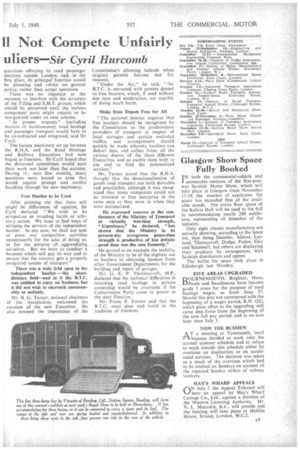Ii Not Compete Unfairly
Page 5

If you've noticed an error in this article please click here to report it so we can fix it.
uliers Sir Cyril Hurcomb
questions affecting its road passenger interests outside London, and, in the first place; its principal function would be planning and advice on general policy, rather than actual operation.
There was no intention at the moment to interfere with the structure of the Tilling and S.M.T. groups, which would be preserved until the various component parts tright require to be • reorganized under an area scheme. In proper respects" (including matters of maintenance), road haulage and passenger transport -would have to be co-ordinated and integrated, said Sir Cyril.
The liaison machinery set up between the R.H.A. and the Road Haulage and Railway Executives had now begun to function. Sir Cyril hoped that the divisional committees would start their work not later than the autumn. During th next few months, many questions were bound to arise that would require prompt and careful handling through the new machinery.
Free Haulier to be Used
After pointing out that there still might be differences of opinion, Sir. Cyril declared: 'We wish to be scrupulous in avoiding harsh or arbitrary action. We hope to find ways of utilizing the services of the independent haulier. in any case, we shall not seek to press our competitive activities unnecessarily for the sake of doing so, or for the purpose of aggrandizing ourselves. But we have to conduct a business which will pay its way and to ensure that the country gets a properly integrated system of transport."
There was a wide field open to the independent haulier—the shortdistance field—and in it the B.T.C. was entitled to carry on business, but it did not wish to encroach unreasonably or unfairly.
Mr. B. G. Turner, national chairman of the Association, welcomed the creation of the new Executive. He also stressed the importance of the Commission's allowing latitude when original permits became due for renevia I.
"Under the Act," he said, "the B.T.C. is entrusted with powers denied to free hauliers, which, if used without due care and moderation, are capable of doing much harm.
Make State Depots Free for All "The national interest requires that free hauliers should be recognized by the Commission as the predominant providers of transport in respect of local cartaaes and certain excluded traffics, and arrangements should quickly be made whereby hauliers can &lever into, and collect from, all the various depots of the three different Executives, and so enable them both to use and to feed the nationalized services."
Mr. Turner stated that the R.H.A. thought that the denationalization of goods road transport was both desirable and practicable, although it was recognized that many companies could not be returned to free enterprise in the same state as they were in when they were nationaized.
He expressed concern at the continuance of the Ministry of Transport at virtually war-time strength. "Experience," he declared, "has shown that the Ministry in its present-day overgrown peace-time strength is productive of less definite good than was the case formerly." He quoted as an example the inability of the Ministry to be of the slightest use to hauliers in obtaining Jicences from other Government Departments for the building and repair of garages.
Mr. G. E. P. Thorneycroft, M.P., declared that the technical difficulties in returning road haulage to private ownership would be overcome if the Conservative Party came to power at the next Election.
Mr. Frank F. Fowler said that the B.T.C. must plan and build in the tradition of freedom.
































